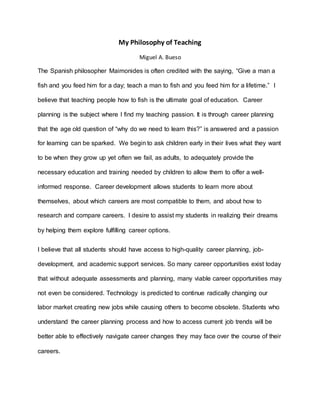
My Teaching Philosophy
- 1. My Philosophy of Teaching Miguel A. Bueso The Spanish philosopher Maimonides is often credited with the saying, “Give a man a fish and you feed him for a day; teach a man to fish and you feed him for a lifetime.” I believe that teaching people how to fish is the ultimate goal of education. Career planning is the subject where I find my teaching passion. It is through career planning that the age old question of “why do we need to learn this?” is answered and a passion for learning can be sparked. We begin to ask children early in their lives what they want to be when they grow up yet often we fail, as adults, to adequately provide the necessary education and training needed by children to allow them to offer a well- informed response. Career development allows students to learn more about themselves, about which careers are most compatible to them, and about how to research and compare careers. I desire to assist my students in realizing their dreams by helping them explore fulfilling career options. I believe that all students should have access to high-quality career planning, job- development, and academic support services. So many career opportunities exist today that without adequate assessments and planning, many viable career opportunities may not even be considered. Technology is predicted to continue radically changing our labor market creating new jobs while causing others to become obsolete. Students who understand the career planning process and how to access current job trends will be better able to effectively navigate career changes they may face over the course of their careers.
- 2. My life was literally saved by career services I received at my local community college over twenty five years ago. I had never taken a career assessment or received career counseling of any kind in high school or during my undergraduate studies. Like many adolescents when I was 17, I believed that money was the key to happiness. That was the primary reason that I decided to major in Business Administration. After graduating I began my business career diligently climbing the corporate ladder for 10 years. I eventually earned a coveted slot in a “Fast-Track” training program where I spent the next year being trained at branches all over the country. After completing the training I was promoted into a mid-management position supervising workers with many more years of experience than I. Despite my success I was more unfulfilled than ever. I eventually grew so disheartened that I knew I had to make a career change. I went to my local community college desperate for help. That is where I receive career counseling and was encouraged to take my first ever career assessment at the age of 30. My assessment results really grabbed my attention when I read that there was an extremely low compatibility correlation between my personality and business administration. Instead, my assessment results indicated that I have what psychologist John Holland called a “Social” personality which is fulfilled primarily by careers that provide individuals or groups with services such as teaching, counseling, and nursing. I will never forget the feeling of excitement I experienced at that moment. I felt like I had discovered who I was for the first time in my life! I teach today because I want to spark that same enthusiasm and excitement in the lives of my students. I have been the transition coordinator for The Pathways Schools for the past 25 years where I teach and counsel students with emotional and behavioral
- 3. disorders how to prepare for the world of work and plan a path to their dream careers. I teach students how to identify their interests and values, how to complete interest assessments and interpret the results, how to research career options, how to “sell themselves” to prospective employers, how to develop and type their résumés, and the dos and don’ts of interviewing. I have also helped our organization develop a full range of work opportunities for students including paid work crews, paid and unpaid internships, as well as, job-hunting trips to help them get part-time jobs near their homes. Desiring to provide fresh, innovative approaches to teaching career development, at times when instructional resources are limited, I have created my own materials and curriculum which I have used successfully with teens and adults alike. In 2004 I was recruited to join Montgomery College as an adjunct professor where I continue to teach career planning, job-hunting best practices, and academic survival skills, as well as, provide individual career counseling services in Workforce Development and Continuing Education. Nothing is more professionally satisfying for me than when a student is successful in part due to something I helped them learn. Teaching has allowed me to mentor students and contribute to their intellectual growth, as well as, gain new perspectives on topics that that I teach and reexamine the key ideas and assumptions that shape the production of knowledge in my field.